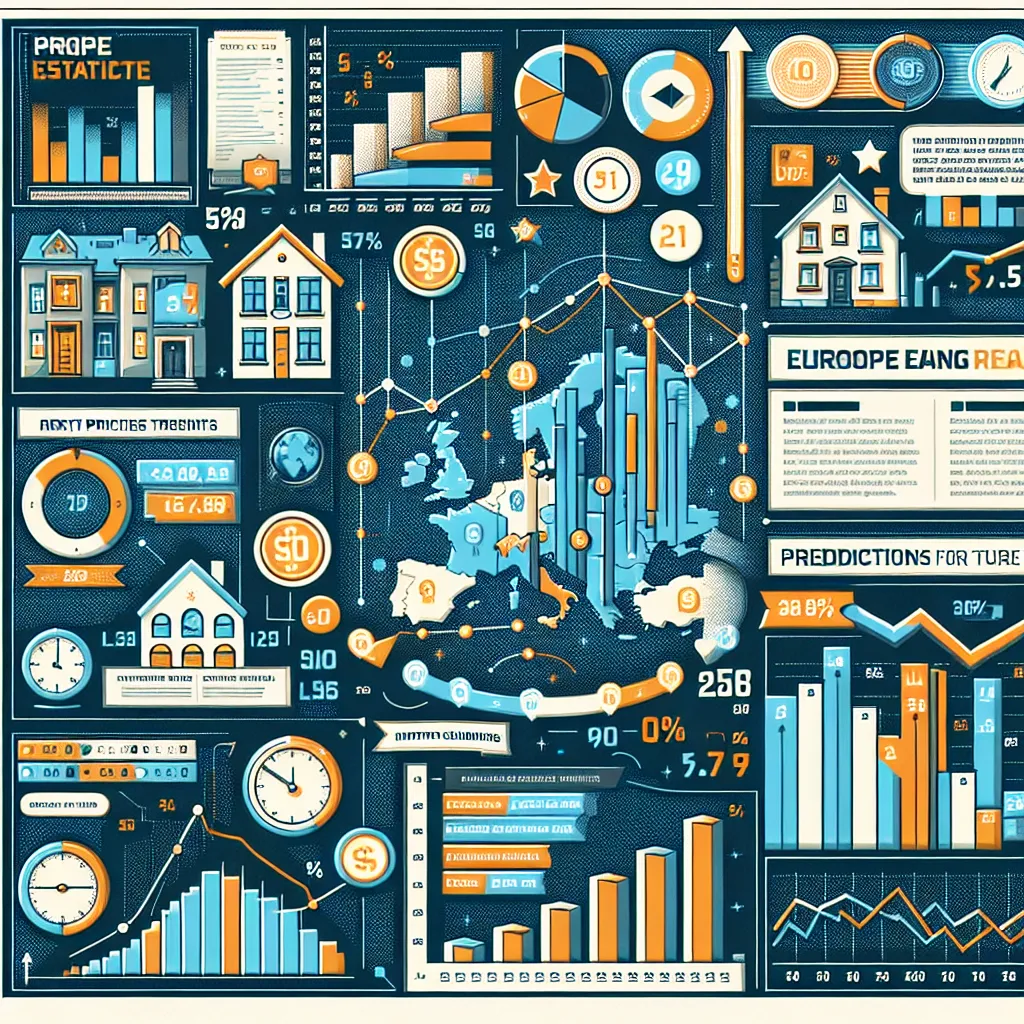How are the pandemic and the economy affecting the housing market in Europe?

- What are the key findings of Deloitte's real estate market research?
- How does inflation affect the real estate market and prices in Europe?
Deloitte and its real estate market research
The international consulting and auditing company Deloitte presented the 11th version of its important research called Property Index, which focuses on the analysis of market trends in residential real estate across Europe. This report is in high demand among potential property buyers as well as major public and private organizations due to its detailed information and accurate data. In this article, we will discuss the key findings and facts from this study.
Rising prices for new buildings
The results presented in the study indicate that Prague has experienced a significant increase in prices of new buildings - by20.13%per year (period from 2020 to 2021). This puts Prague in first place among European capitals in terms of apartment price growth. In the UK, the price per square meter in new residential properties reaches a value of approx.€4,905This makes it the leading country in terms of housing costs on the continent. In the context of housing affordability, it is worth noting that in Bosnia and Herzegovina the average price per square meter in new buildings is only€974This makes this country the most budgetary among the regions considered in the report.
The most expensive cities to buy real estate
It is also worth mentioning that Paris, as the capital of France, has been recognized as the most expensive city in Europe to buy a new property, ahead of major cities such as Munich, London and Oslo. Average rental rates in the French capital are as follows€29per square meter, which puts Paris at the top position among European cities in terms of rental cost. Interestingly, Berlin, the capital of Germany, was the only city among the capitals where the average price of new buildings remained stable compared to the previous year.
Purchasing power
If we look at purchasing power, in the Czech Republic a resident will need to spend13 years and three monthsto save up to buy an apartment70 square meters. This is the longest term required among all European countries.
Economic context
The economic context also plays an important role in changes in the real estate market. Over the past six years, the euro area economy has enjoyed dynamic growth since the sovereign debt crisis in 2012-2013. However, the positive momentum was disrupted by the COVID-19 pandemic. In 2020, there was a sharp decline in gross domestic product (GDP) by6.6%which particularly affected Spain and Italy.
Economic recovery
The eurozone economy started to recover with growth in 20215.4%. However, despite the rapid rebound, indicators are still below pre-pandemic levels. The recovery took place against a backdrop of disruptions in global supply chains, which also contributed to higher prices for construction materials and commodities.
Predictions for the future
The International Monetary Fund (IMF) predicts that this year the eurozone economy will grow by2.8%. However, there are concerns that dependence on Russian gas supplies may have a negative impact on the economic situation in Europe, given the current events in Ukraine and the sanctions imposed on Russia, which creates a risk of recession.
Influence of inflation
To summarize, the combined effect of supply chain disruptions, the energy crisis and higher commodity prices contributed to accelerating inflation. In April, the inflation rate in the euro area rose to7.5%in year-on-year terms, and by July had already reached8.9%This is the highest level in recent years.
Relevance of inflationary processes
Expectations of accelerating inflation are becoming increasingly urgent.
29 September
9 October 2024
9 October 2024


Real estate market and economic changes
The real estate market is one of the most sensitive to economic fluctuations, especially in light of changes in gross domestic product (GDP) and interest rate movements. Tighter monetary policy often leads to lower demand for mortgage loans, which in turn can have a negative impact on the housing market and slow down price growth.
Real estate and investment information
We have created a special channel on Telegram that provides the latest information on real estate, immigration issues and investment opportunities. The charts show data on residential construction in European countries for 2021, both in total and per thousand inhabitants.
Housing shortage in Europe
It is important to note that in the past year, countries such as Bosnia and Herzegovina, Latvia, Spain, Portugal and Slovenia recorded less than two finished apartments for every thousand inhabitants. This, in turn, is due to the housing shortage, which is considered to be one of the main reasons for the increase in prices, which will not make new buildings more affordable in the foreseeable future.
Construction in Germany
In Germany, approximately 310 thousand new real estate objects were built during the year. Despite the relatively good figures for the amount of housing built per capita, the country's major cities are not experiencing the expected price growth. Moreover, in the leading cities of Germany, the cost of apartments and houses for the first time in a long period is beginning to show a decline.
Reasons for the decline in house prices
The main reason for this phenomenon was not only the low rate of construction, but also the high level of interest rates on mortgage loans.
Poland's leadership in construction
Poland stands out from Eastern Europe as a real leader in the construction sector. It should be noted that despite the excellent rate of building construction, the government continues to actively pursue activities that stimulate development activity.
- In June 2022, it became known about the decision of the Polish authorities to abolish the mandatory obtaining of permits for the construction of individual dwellings.
- The decision is aimed at improving the housing shortage in the country.
Housing prices in Europe
Regarding residential real estate prices in Europe, a study conducted by Deloitte covers 23 countries and 68 cities in the region. To ensure comparability, the data in the study is presented in euros, and potential price growth may depend on fluctuations in exchange rates.
Discrepancies in housing prices
The graphs show that from December 31, 2020, to December 31, 2021, changes in the exchange rates of national currencies did not exceed 5%. Although the countries of the European Union have strong economic ties, the real estate market in these countries demonstrates significant differences.
The United Kingdom as the most expensive country
According to the research, the highest cost of new buildings in 2021 was noted in the United Kingdom, where one square meter of living space cost approximately €4,905. This highlights the significant discrepancies in housing prices across Europe, making the real estate market a relevant topic for serious study and analysis.

Conclusion
In conclusion, it is worth noting that the Deloitte study conducted as part of the Property Index provides valuable insights into the dynamics of the residential real estate markets in Europe and helps us better understand how various economic factors influence these markets. It is undeniable that the rising housing prices in countries like the Czech Republic and the United Kingdom, the differences in the average cost per square meter, as well as instances of price stabilization, such as in Berlin, reflect not only the changing conditions in the market but also the economic realities that we all will have to face.
The influence of macroeconomic factors
Among the listed factors, the influence of macroeconomic conditions stands out, particularly economic growth, inflation rates, and changes in interest rates.COVID-19 pandemicThe subsequent economic fluctuations have created a unique situation that requires us to be flexible and ready to adapt to new conditions. Moreover, the consequences of the energy crisis and the unstable geopolitical situation, such as the situation with Russian gas, could exacerbate the market conditions and lead to unpredictable outcomes.
Important observations
- Housing pricesIn the Czech Republic and the United Kingdom, there is a rapid growth being observed.
- Price stabilization inBerlintalks about possible changes in market dynamics.
- Macroeconomic conditions, such asinflationChanges in interest rates play a key role in the housing market.
- Uncertainty associated withenergy crisismay negatively impact the real estate market.
Conclusion
Thus, I have come to the conclusion that careful study of trends in the real estate market is not just necessary, but essential. This can help not only potential buyers but also investors and government agencies in developing strategies aimed at addressing housing policy issues and market stability. Undoubtedly, each region has its own nuances, and understanding these differences will contribute to more informed decisions in the future.
Comment
Popular Posts
29 September
377
9 October 2024
9940
9 October 2024
1485
Popular Offers

Subscribe to the newsletter from Hatamatata.com!
Subscribe to the newsletter from Hatamatata.com!
I agree to the processing of personal data and confidentiality rules of Hatamatata












